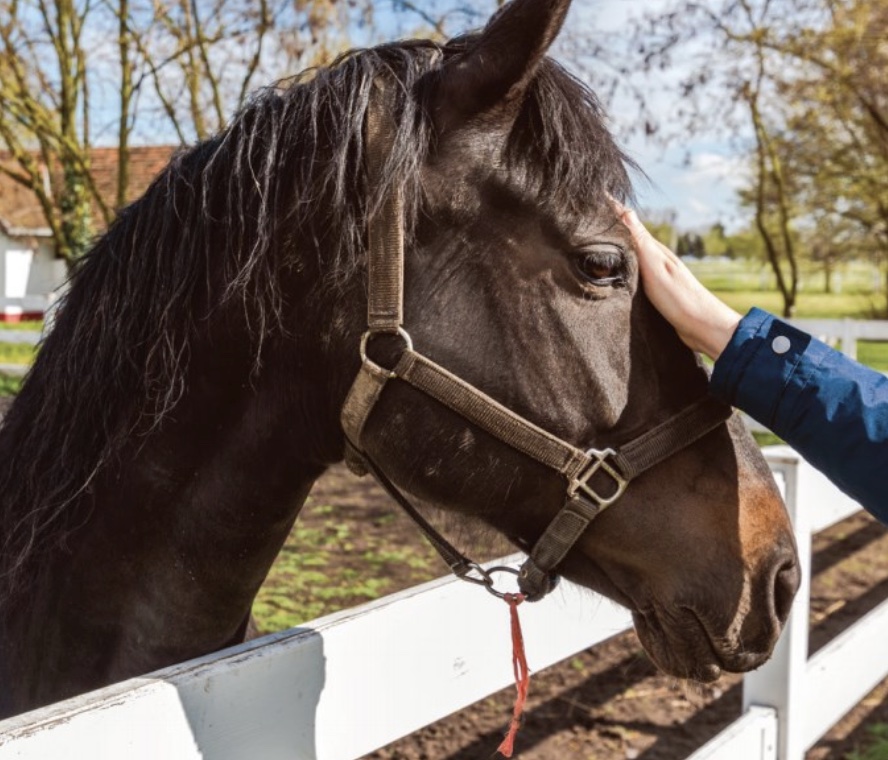Earlier this year, the U.S. Department of Health and Human Services released the results of a survey finding that among people 12 or older in 2021, 46.3 million met the criteria for having a substance abuse disorder – 16.5% of the U.S. population. And of those with a substance abuse disorder, 94% did not receive any treatment.
A substance abuse disorder is a common struggle, but it doesn’t have to be a permanent problem. Waypoint Recovery Center in Cameron, South Carolina, understands this and is committed to helping it’s patients along their recovery journey through many types of therapy.
Waypoint Recovery Center recently partnered with Dr. Kathleen Broughan and the Lowcountry Equine Assisted Psychotherapy program in Wadmalaw, South Carolina. Patients at Waypoint have the opportunity to participate in equine therapy twice a month.
Dr. Broughan explained why and how equine therapy is a powerful tool in the treatment of addiction and mental health: “Equine-assisted psychotherapy is an experiential therapy involving a licensed mental health professional, an equine specialist and one or more horses. Although it may seem ‘magical,’ the equine-assisted approach is supported by research in neuroscience, and equine-assisted psychotherapy is evidence-based.”
“Horses never lie but give straightforward feedback about how they are feeling about what is happening around them and to them,” she added. “They are particularly suited to working with people with trauma histories or addiction issues because of their ability to read the energy of their human partners, emotionally connect with the participants and instill a sense of trust, safety and well-being in this connection.”
Cherie Tolley, CEO of Waypoint writes: “Patients who are not comfortable opening up about their feelings, or who are even afraid of horses, have reported how powerful this experience has been toward their recovery. Horses are such soulful and spiritual animals. Through their own instincts and sensitivity, horses are able to facilitate the healing process for many who are not able to respond to traditional therapies.”
Christi Bonham, director of business development at Waypoint, added: “Horses are able to pick up on human emotions more so than a lot of other animals. Sometimes, because of their size, a lot of people are intimidated, but once they start brushing the horse, they can learn how to trust themselves and others and develop some coping skills. The horses are able to pick up on human emo tions and help them gain some insight into their behavior.”
Spending time caring for any kind of animal can be beneficial for mental health, but, for people who struggle with a substance abuse disorder, taking care of horses in particular can help them understand their own emotions better through an animal that can reflect those emotions back to them.
Patients who are in treatment at Waypoint Recovery Center for 10 days or more has the option of adding equine therapy into their treatment plan, along with other activities such as golf or hiking. Tolley added that it is important for individuals to understand they can find enjoyment in everyday activities and special events without using drugs or alcohol.
Waypoint Recovery Center aims to help anyone struggling with a substance abuse disorder, but it has some specific programs tailored to helping military veterans and first responders on their recovery journey. Waypoint is Psycharmor-certified and is contracted through the Department of Veterans Affairs Community Care Network. Equine therapy can help veterans dealing with trauma and depression as well as a substance abuse disorder.
As substance abuse disorders have spiked in recent years, having resources such as equine therapy in its arsenal has given Waypoint Recovery Center another way to show patients how they can live their lives without turning to the substances that have harmed them.
The patients can gain a better understanding of their inner world and repair their relationships with the people around them by gaining trust in the horses and themselves. Patients can look forward to a richer, more fulfilling life with the help from Waypoint.
By Katherine Waters
